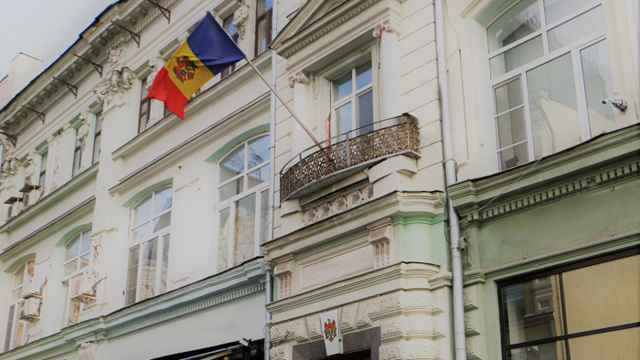Three years ago, the Dostoevsky Library at 23 Chistoprudny Bulvar was much like any other library in the Russian capital: dark, cramped and nearly deserted.
Now, its huge first-floor windows reveal an airy space filled with readers, testifying to the potential that lies in Moscow's hundreds of other public libraries.
This is potential that, reformers say, is still largely dormant, despite an ambitious program launched by former Moscow City Hall Culture Department head Sergei Kapkov three years ago that brought about the renovation of the Dostoevsky Library.
A true reformation would require a revolution in service culture from Soviet-era norms and disciplinarian librarians that seem targeted to repel visitors.
"The reform has failed up to this point because the mental changes in the system haven't happened yet," said Boris Kupriyanov, owner of the independent bookstore Falanster, who headed the reform effort until April this year.
History
The state-funded reform drive must overcome a legacy of neglect that has left an indelible mark on Russia's vast library system.
Russia's libraries were struck hard by the lack of public financing in the 1990s, which saw many libraries close across the country.
A study published by the independent Levada Center in 2008 found that the number of libraries in Russia collapsed from more than 62,000 in 1990 to 48,000 in 2006. The number of people with library memberships fell from 72 million to 58 million over that period.
The Russian capital now boasts 452 public libraries with a total of 2.25 million members registered as of the end of 2014, according to the Moscow Library Center, an agency set up by the Culture Department to oversee the reform program, but few of them manage to draw many visitors in from the street.
This failure at times comes down to the most simple and habitual design flaws. For example, the windows of many Soviet-era libraries are covered with bars and curtains, which obstruct the view from the street.
"In those libraries where we took all the security bars and curtains away from the windows, the number of visitors grew up to 20 percent the next day," Kupriyanov said.
Reform
The great success of the reforms is the Dostoevsky Library, which has managed to increase its number of daily visitors from 50 to 400 following the renovation in 2013.
The library's new design, with windows opening out onto the street and comfortable work spaces, certainly has something to do with its success, as does the free wireless Internet it now offers.
But improving the atmosphere also required overturning the stereotype of the stern, forbidding Soviet librarian.
"We have changed the communication style between visitor and library worker. It is friendly now!" the library's director Andrei Lisitsky told The Moscow Times.
Another success is the Turgenev Library, a classic Moscow venue established in 1885 that fell into near disuse in the 1990s.
Since the library began offering free wireless Internet, created a page on Facebook and decided to lower the minimum age of members from 18 to 14, the number of visitors rose from 100,000 in 2012 to 150,000 in 2014.
Most of this growth was from visitors between the ages of 20 to 35 — the very group that libraries often struggle to reach, the library's director Alexandra Vakhrusheva said.
All money for the reform came from taxpayers; Moscow City Hall's Culture Department gives the cities' libraries 3.8 billion rubles ($70 million) annually, said Maxim Fetisov, the head of the Moscow Library Center.
Some libraries are now trying to develop their own income, though so far with limited success. In addition to the 45 million rubles ($830,000) that it receives from the city, the Turgenev Library funds itself to the tune of 2.5 million rubles a year ($46,000) earned through paid services such as book restoration, computer training, translations, lectures, concerts and a copy shop.
Experts polled by The Moscow Times agreed that Russian libraries will always rely heavily on state support.
"I don't know of any cases when a library has a successful business model. Even the New York Public Library earns only around 30 percent of its budget," Fetisov said.
Fighting the Current
But for every success story from the reform program, there are others that show just how little has changed. Most libraries are still managed by "unsociable people who don't read books," Kupriyanov said, adding that they tend to view the libraries as their own private kingdoms rather than public spaces.
Meanwhile, some libraries that claim to have attracted more visitors since the reform began may actually just be tampering with their statistics, he added.
In his time in the reform effort, Kupriyanov once sat in one library — Moscow's Children's Library No. 6 — for 10 days, just counting visitors. What he discovered shocked him.
"[On paper] the library has 45 000 visitors per year, but in reality they have no more than 10 visitors per day!" Kupriyanov said.
Kupriyanov quit his position as deputy director of the Moscow Library Center in April this year — only a few weeks after Kapkov resigned as head of the Culture Department.
The job was "a Sisyphean task," Kupriyanov said, referencing the mythological Greek king Sisyphus, whom the gods punished by forcing him to roll a massive boulder up a hill, watch it roll down again, and repeat the action for all eternity.
Contact the author at bizreporter@imedia.ru
A Message from The Moscow Times:
Dear readers,
We are facing unprecedented challenges. Russia's Prosecutor General's Office has designated The Moscow Times as an "undesirable" organization, criminalizing our work and putting our staff at risk of prosecution. This follows our earlier unjust labeling as a "foreign agent."
These actions are direct attempts to silence independent journalism in Russia. The authorities claim our work "discredits the decisions of the Russian leadership." We see things differently: we strive to provide accurate, unbiased reporting on Russia.
We, the journalists of The Moscow Times, refuse to be silenced. But to continue our work, we need your help.
Your support, no matter how small, makes a world of difference. If you can, please support us monthly starting from just $2. It's quick to set up, and every contribution makes a significant impact.
By supporting The Moscow Times, you're defending open, independent journalism in the face of repression. Thank you for standing with us.
Remind me later.






